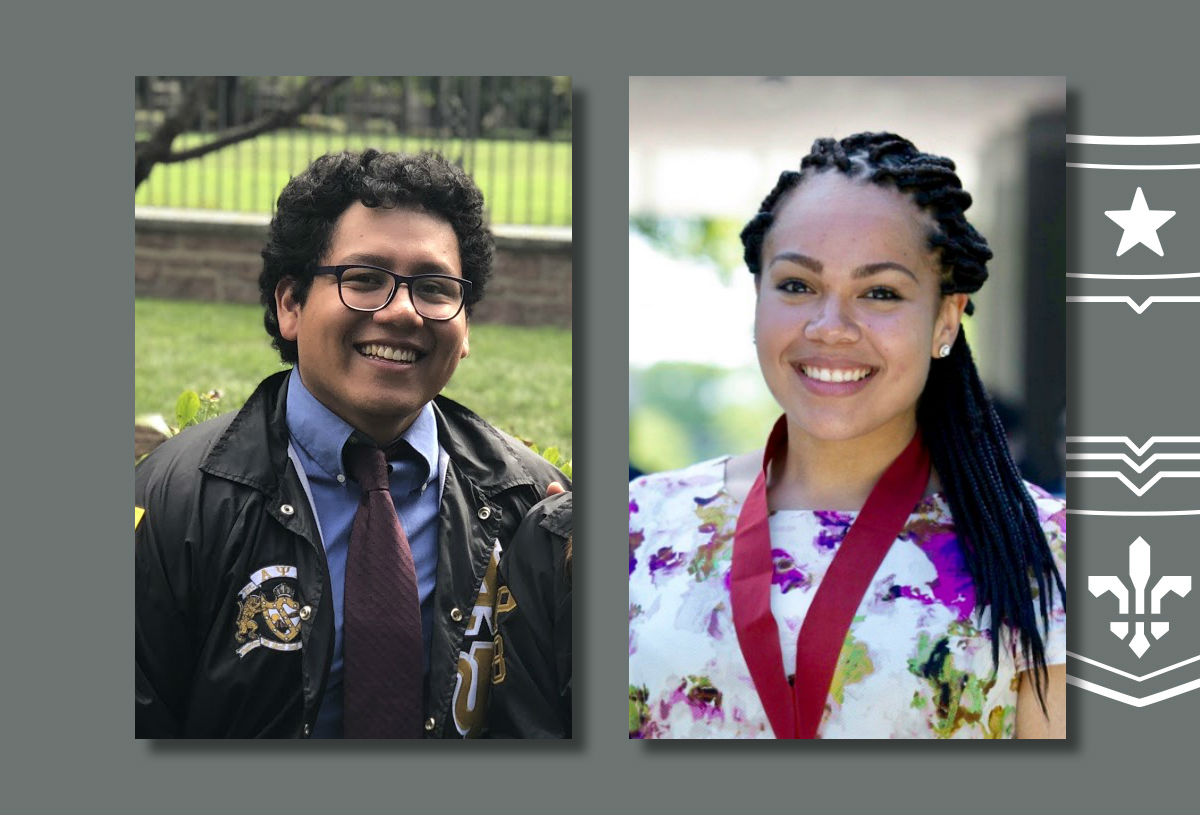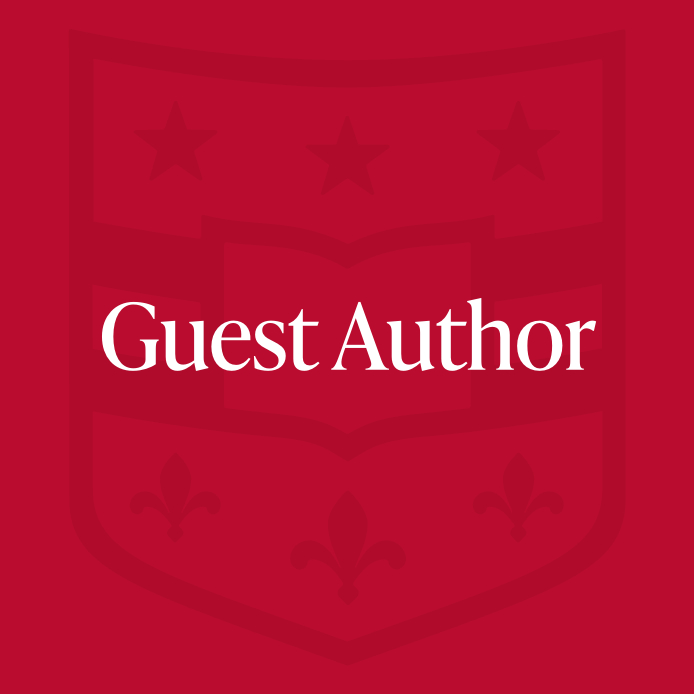First-generation students: Capitalizing on opportunity
- November 18, 2018
- By Guest Author
- 7 minute read

In 2017, two organizations joined forces to launch what has now become an annual event: the First-Generation College Celebration. The Council for Opportunity in Education and the Center for First-generation Student Success created the annual commemoration to “celebrate the success of first-generation college students, faculty, and staff on (our) campus in any and every way possible.”
For our commemoration of first-generation college student day, WashU Olin introduces you to two members of our community: Omoluyi Adesanya, MPH/MBA 2020, and David Leon, BSBA 2020. Both speak of overcoming obstacles and their desire to capitalize on the sacrifices their families have made.
What does it mean to you to be the first in your family to go to college?
Adesanya: To me, being a part of the first generation in my family to go to college (after my elder brother) means overcoming the obstacles and challenges that have penetrated my family for generations.
Leon: Being the first in my family to go to college means making sure all the sacrifices my parents and family made to get me here don’t go to waste.
Adesanya: My mother’s family German heritage and immigrated to the USA from Germany. In the USA, they live in rural America as generational farmers in southern Illinois. At the age of 23, my father immigrated to the USA from Nigeria in pursuit of a more promising future filled with opportunity. My father was not familiar of the pathways of higher education in the US. My paternal grandmother, whom I am named after, was an illiterate, she never had the opportunity to attend school due to the fact that in Nigeria females did not have the right to obtain an education during her era.
Leon: I want to be an example for all the students who come after me, especially my siblings. It means paving a path and continuing to strive for change that will allow others the opportunity to be successful.
Adesanya: Being from a family of immigrants and having lived in both rural and urban America, I have seen first-hand the value of education from my own family’s lack of opportunity to obtain an education. Through these various setbacks, I do not look at the negative aspects; instead I see these disadvantages as a positive part of my life—times to make sure I accomplish my future aspirations. To me, having obtained a college degree and continuing my academic journey in a graduate program allows me to realize that knowledge truly is power. Throughout my educational pursuits and knowing my family’s humble beginnings, I have been inspired to build my personal resilience and determined to obtain an education, which much of my family did not have the opportunity to pursue. This is what being the first in my family to attend college means to me.
How do you envision using your education going forward?
Leon: I will use my education to continue to foster positive change in the communities I belong to, while exploring my passions and allowing my curiosity to lead me to new opportunities.
Adesanya: I am a dual-degree student doing the MPH/MBA program at the Brown School and Olin Business School. Based off of my past experiences, I have endured various circumstances which have inspired me to obtain an MPH/MBA degree. Having lived in both urban and rural areas of America, I have witnessed disparities particularly in the healthcare sector.
Leon: WashU has provided me with an education and skills that will continually allow me to make an impact throughout my career.
Adesanya: Throughout my education, I came to realize that the regions of which I grew up were very economically disadvantaged and medically underserved. Medically, there is a county hospital in my hometown, however the nearest academic healthcare center is over one hour away. The county hospital provides primary care but does not have on-staff specialists available for people in our hometown.
In personally experiencing these hardships, I have been and continue to be inspired to keep pushing across my own academic hurdles and challenges to one day serve society through the integration of public health and business by changing the accessibility, affordability, and delivery of healthcare services. Looking at my future education pursuits, right now, I do not have any concrete plans if I will pursue further education after my MBA/MPH program, but I do know I want to provide a positive impact and actively engage with communities.
Having grown in a disadvantaged background and having personally experienced both income and health inequities, I aspire to use my knowledge gained in my MPH/MBA program to help the communities of which I represent and come from.
Briefly describe your academic journey.
Adesanya: During my formative years, my family lived in a small rural town of 5,000 people. This town is close to my mother’s family, therefore, it was great to grow up near extended family and know the importance of family especially while a child. Through the national A Better Chance foundation, I was provided the opportunity to attend a boarding school for my high school education at The Hockaday School in Dallas, Texas.
Leon: My academic journey has been filled with figuring out the intricacies of this country’s education system. My parents moved me across many different schools in an effort to provide me the education they never had.
Adesanya: While at Hockaday, the transition to an all-girls, urban, boarding school from a small rural, co-educational, public school was not easy. At times, I had to teach myself how to re-analyze certain topics in the classroom, and I had to constantly push myself to re-learn certain material with the help of tutors and professors at Hockaday, but with my constant perseverance and will, I graduated from a top-tier high school and matriculated into The University of Chicago for my undergraduate studies.
Leon: I attended an elite Chicago high school and eventually arrived at WashU as someone who continued to defy the societal expectations set before them.
Adesanya: At UChicago, I was presented with a rigorous and humbling collegiate experience. During college, I worked part-time in a laboratory doing research for not only the better learning of science and healthcare, but also, as part of my student work-study to pay for some of my fees to attend college. Working, being a campus leader, and going to school at the same time allowed me to prioritize my time effectively while remaining engaged in the campus community. Through my tested will and work ethic, I majored in the Biological Sciences with a specialization in Endocrinology, and I minored in Human Rights.
After college, I was accepted to the National Institutes of Health Intramural Research Training Award Fellowship Program in Bethesda, Maryland. Being at the NIH allowed me to have a three-year work-experience while growing both as a student and as a professional. After the NIH, I became motivated to apply to graduate school and pursue a career focused around population and preventative healthcare, therefore, I matriculated to WashU for my MPH program. After the first semester of my MPH program, I was exposed to a wide variety of course topics and began to realize the importance of business concepts in the healthcare industry; therefore, I became motivated to apply to the dual-degree MPH/MBA program.
As a second-year in the three-year program, I am able to see the vital importance of integrating the healthcare and business fields together as it provides me with the enriching opportunity for trans-disciplinary learning.
When looking at the past disadvantages that I have endured, though at times it was challenging to overcome these hurdles, they continue to leave a positive impact on my academic performance and personal outlook on my future goals. From my family’s lack of education, I ensured that I will be resilient throughout my academic journey, so that I can best be equipped to represent and serve the underserved communities that I call home.
Why WashU?
Leon: I chose to come to WashU because of the opportunity to make a difference on campus. The ability to change the campus as a member of many marginalized communities as well as the prestige of Olin Business School made my decision very easy.
Adesanya: After working in DC, I knew I wanted to relocate to the mid-west region of the states as it is closer to home and to my family. Knowing WashU’s strong reputation for equipping students with a well-rounded and strong academic experience, I became inspired to apply to WashU for my graduate school studies. Moreover, at WashU I had the opportunity and flexibility to obtain a dual-degree, MPH/MBA, and with my interest in both fields, I knew that WashU would provide me a unique, enriching graduate school experience.
Not only did the academic reputation and positive student experience motivate me to apply to WashU, but also the city of St. Louis. As a student, I firmly believe the importance of civic engagement on campus and within the surrounding St. Louis community. In many ways St. Louis represents a microcosm of many other American cities, it is a growing and thriving city with opportunity, especially for students.
Being interested in public health and improving the healthcare industry, the cities’ urban environment allows me to learn from the current health disparities and inequities which persist in the city. Thus given my personal ambitions at improving community health, the city of St. Louis also influenced my decision.
As a second-year graduate student, at WashU, I continue to find that not only do I have a well-rounded educational experience in the classrooms, but also, I am able to be active in civic engagement within the metropolitan St. Louis community.
Media inquiries
For assistance with media inquiries and to find faculty experts, please contact Washington University Marketing & Communications.
Monday–Friday, 8:30 to 5 p.m.
Sara Savat
Senior News Director, Business and Social Sciences
